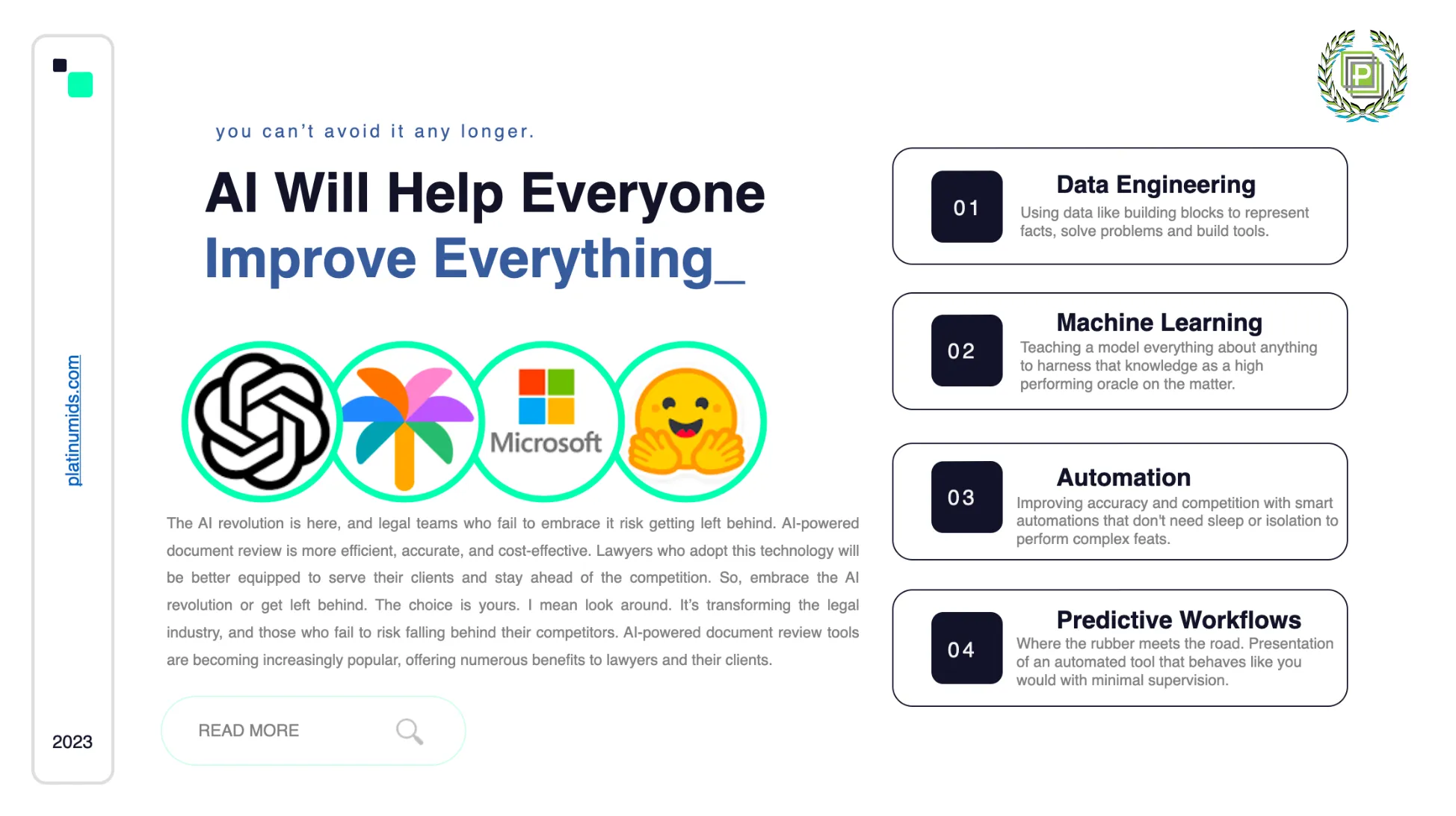
The End of Keyword based Document Review. Keywords have their place, it’s just not your strategic core. We can do so much better.
Gone are the days when lawyers had to manually review piles of documents before presenting them in court. With the advent of Artificial Intelligence (AI), document review is no longer a tedious and time-consuming task. AI-powered document review is revolutionizing the legal industry, and it’s high time that lawyers embrace this technology to stay ahead of the competition.
In the past, document review was often a numbers game. Lawyers would start with a completely hypothetical list of keywords, applying them to a structured database of collected and processed document, then spend hours poring over documents, trying to identify relevant information, and often missing crucial details, not to mention the tons of evidence eliminated before the review even started thanks to keyword filtering. This process was not only time-consuming but also prone to errors. However, with AI, document review has become more efficient, accurate, and cost-effective. There are more steps, but if you can accept the process you’ll find that small groups, even solo initiatives can achieve extraordinary, comprehensive results rivaling any other methodology available period.
The traditional keyword-based document review process that lawyers relied on in the past is quickly becoming a thing of the past thanks to Artificial Intelligence (AI). Lawyers no longer need to spend countless hours sifting through documents manually, trying to identify relevant information. AI-powered document review is transforming the legal industry by providing a more efficient, accurate, and cost-effective way of reviewing documents.
In the past, lawyers would use a list of keywords to filter through a database of documents and eliminate irrelevant ones. However, this approach was prone to errors and often missed crucial details. With AI, the document review process is more comprehensive and effective. AI algorithms can analyze large volumes of data, identify patterns, and extract relevant information quickly and accurately.
While the AI-powered document review process may involve more steps, the benefits it offers are undeniable. Even small legal teams or solo initiatives can achieve extraordinary results that rival those of larger teams using traditional methods. By embracing AI-powered document review, lawyers can enhance their efficiency, reduce errors, and save time and money, all while staying ahead of the competition.
AI: The New Gold Standard in Document Review
AI has transformed document review by automating the process of identifying relevant information. AI-powered algorithms can analyze large volumes of data in a fraction of the time it would take a human reviewer. This technology can identify patterns, relationships, and trends in the data, which can help lawyers make more informed decisions.
AI can also learn from past document review experiences, making it more accurate and efficient over time. This technology can identify patterns in documents that are not immediately apparent to a human reviewer, making it an invaluable tool in complex cases.
AI has truly become the new gold standard in document review, as it drastically improves efficiency and accuracy in legal document analysis. Modern organizations store data in multiple sources, such as customer relationship management (CRM) systems, financial data, spreadsheets, and PDFs. AI-powered document review tools can analyze thousands of these documents in a fraction of the time it would take a human reviewer, allowing lawyers to focus on more strategic tasks and make better-informed decisions.
One notable example of AI-powered document review is Document Intelligence from Thomson Reuters, which combines the power of AI with the expertise of Practical Law. This platform allows lawyers to analyze contracts and documents with ease, identifying significant differences and relevant information.
As AI continues to learn from past document review experiences, its accuracy and efficiency improve over time. This self-improving technology can identify patterns and relationships in documents that might not be immediately apparent to human reviewers. This makes AI an invaluable tool in complex cases, where large volumes of data need to be reviewed and analyzed quickly and accurately.
In summary, AI has become the new gold standard in document review, providing lawyers with a faster, more efficient, and accurate way of analyzing legal documents. By leveraging AI-powered document review tools, legal professionals can stay ahead of the competition and better serve their clients.
The Benefits of AI-Powered Document Review
The benefits of AI-powered document review are numerous. Firstly, it saves time and money. AI can analyze large volumes of data in a fraction of the time it would take a human reviewer, freeing up lawyers to focus on other tasks. Secondly, it’s more accurate. AI-powered algorithms can identify patterns and relationships that a human reviewer might miss, making it a valuable tool in complex cases. Finally, it’s more reliable. AI can learn from past experiences, making it more accurate and efficient over time.
The benefits of AI-powered document review extend beyond time and cost savings, accuracy, and reliability. Here are some additional advantages derived from the adoption of AI in document review processes:
- Improved decision-making: AI-powered document review tools, such as Document Intelligence from Thomson Reuters, offer a more comprehensive analysis of legal documents by leveraging AI and expert knowledge. This empowers lawyers to make better-informed decisions, thereby improving the overall quality of legal services.
- Enhanced client experience: By automating document review, lawyers can spend more time on client communication and understanding their needs. This a better overall client experience and increased client satisfaction.
- Scalability: AI-powered document review tools can handle large volumes of data without compromising on accuracy or efficiency. This allows law firms to scale their operations and take on more clients and cases without increasing their workforce.
- Integration with other tools: AI-powered document review platforms can seamlessly integrate with other software and tools, such as customer relationship management (CRM) systems, Microsoft Office, Google Suite, and QuickBooks, streamlining the document review process and making it easier for lawyers to manage their workload.
- Customization and adaptability: AI-powered document review tools can be customized to meet the specific needs of each law firm, ensuring that the most relevant information is extracted and analyzed. Furthermore, as AI learns from past experiences, it becomes more adaptable to the unique requirements of each case.
The Future of Document Review: AI Takes Over?
The future of document review is AI-powered. As AI technology continues to evolve, it will become more accurate, efficient, and reliable. In the future, lawyers may not even need to review documents manually. Instead, AI-powered algorithms will do the work for them, identifying relevant information and presenting it in an easy-to-read format.
The adoption of AI-powered document review is not without its challenges. Some lawyers may be resistant to change, while others may be concerned about the potential loss of jobs. However, the benefits of AI-powered document review far outweigh the challenges.
The future of document review is undoubtedly AI-driven, as AI technology continues to advance and improve in accuracy, efficiency, and reliability. Lawyers may eventually forego the manual review of documents altogether, as AI-powered algorithms take over the task of identifying pertinent information and presenting it in a user-friendly format.
As AI-powered document review becomes more widespread, integrating with various software tools and platforms such as Microsoft Office, Google Suite, QuickBooks, and customer relationship management (CRM) systems will streamline the document review process, making it even easier for lawyers to manage and analyze data.
While the adoption of AI-powered document review comes with challenges, such as resistance to change among some lawyers and concerns about job loss, the benefits it offers far outweigh these concerns. Embracing AI technology in document review can result in more accurate, efficient, and cost-effective legal services, ultimately leading to better outcomes for clients and law firms alike.
In conclusion, AI is set to revolutionize document review, transforming it into a more accurate and efficient process. As AI technology continues to evolve, it will further integrate with other tools and platforms, making it an indispensable part of the legal landscape. Despite the challenges that come with adopting AI-powered document review, the benefits it offers are undeniable, setting the stage for a future where AI takes over the document review process.
Embrace the AI Revolution or Get Left Behind
The AI revolution is here, and legal teams who fail to embrace it risk getting left behind. AI-powered document review is more efficient, accurate, and cost-effective. Lawyers who adopt this technology will be better equipped to serve their clients and stay ahead of the competition. So, embrace the AI revolution or get left behind. The choice is yours. I mean look around. It’s transforming the legal industry, and those who fail to risk falling behind their competitors. AI-powered document review tools are becoming increasingly popular, offering numerous benefits to lawyers and their clients.
There are many AI-powered document review tools available on the market today, such as Document Intelligence from Thomson Reuters and Lawyaw, which help lawyers save time, reduce errors, and improve efficiency in their document review processes.
AI is already being used to review contracts, find relevant documents, and assist attorneys in various aspects of their work. The benefits of AI in the legal industry are undeniable, as it helps streamline processes, improve decision-making, and enhance client experiences.
As legal automation advances in sophistication, its applications continue to expand, from filtering large document review sets during litigation to extracting relevant information for analysis (source: LegalTechNews). This technology is becoming an essential part of the legal landscape, and lawyers who adopt AI-powered document review will be better equipped to serve their clients and stay ahead of the competition.
In conclusion, the AI revolution is here, and it’s time for legal teams to embrace it or risk being left behind. By adopting AI-powered document review tools, lawyers can improve their efficiency, accuracy, and cost-effectiveness, ultimately providing better service to their clients and staying ahead in the competitive legal market. The choice is clear: embrace the AI revolution or get left behind.

